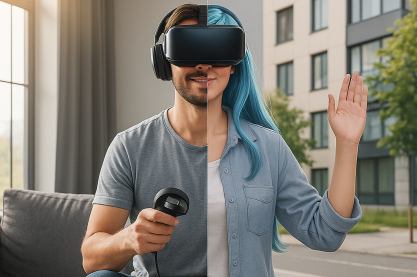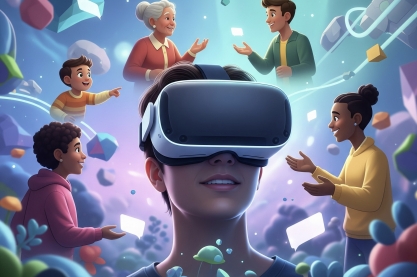La realtà virtuale come strumento di comprensione delle diverse identità di genere

Parole chiave:
virtual reality / VR / identity / gender identity / transgender / prejudice
La realtà virtuale come strumento di comprensione delle diverse identità di genere
Negli ultimi anni, la realtà virtuale (VR) ha trasformato radicalmente le modalità di espressione dell’identità personale, offrendo ambienti digitali immersivi in cui gli individui possono esplorare sé stessi attraverso avatar personalizzati. Questo articolo approfondisce il potenziale della VR come strumento di comprensione, accettazione ed esplorazione dell’identità di genere. Grazie ai meccanismi cognitivi dell’embodiment, gli utenti percepiscono l’avatar come parte integrante del proprio Sé. Tale immedesimazione attiva processi psicologici profondi, tra cui il Proteus Effect (Yee & Bailenson, 2007), ovvero l’influenza dell’aspetto dell’avatar su comportamento, atteggiamenti e percezione di sé. L’incarnazione di avatar di genere diverso dal proprio corpo biologico può favorire consapevolezza identitaria, ridurre il disagio psicologico e promuovere empatia verso persone transgender e di genere non conforme. Inoltre, la VR si configura come potente strumento educativo per la riduzione dei pregiudizi, attraverso esperienze in prima persona che simulano le sfide vissute da individui discriminati (Peck et al., 2013; Banakou et al., 2016). Alla luce delle evidenze emergenti, si delineano nuove prospettive di ricerca e intervento psicosociale, in cui la VR non è solo una tecnologia immersiva, ma una leva per l’inclusione e la comprensione delle identità di genere.
Abstract in inglese
In recent years, virtual reality (VR) has significantly reshaped the ways in which personal identity can be expressed and explored, offering immersive digital environments where individuals engage with personalised avatars. This article examines the potential of VR as a tool for understanding, accepting, and exploring gender identity. Through the cognitive mechanism of embodiment, users come to perceive the avatar as part of their own body and self. This experience can trigger deep psychological processes, including the Proteus Effect (Yee & Bailenson, 2007), whereby the appearance of the avatar influences users’ behaviours, attitudes, and self-perception. Embodying avatars of a gender different from one’s assigned sex can enhance self-awareness, alleviate psychological distress, and foster empathy toward transgender and gender non-conforming individuals. Additionally, VR is emerging as a powerful educational tool for reducing prejudice, allowing first-person simulations of the challenges faced by those who experience discrimination (Peck et al., 2013; Banakou et al., 2016). In light of growing evidence, new perspectives are opening for psychosocial research and intervention, positioning VR not only as an immersive technology but as a valuable resource for promoting inclusion and understanding of diverse gender identities.
/ AltroLa Realtà Virtuale Contro i Pregiudizi: Un Nuovo Approccio all’Inclusione
La Realtà Virtuale Contro i Pregiudizi: Un Nuovo Approccio all’Inclusione
This article explores the potential of virtual reality (VR) in reducing intergroup prejudice, a pressing issue in contemporary societies. It examines how VR can provide immersive experiences that promote empathy and understanding between different social groups. Through a review of recent studies, the article highlights the different methods used in VR interventions, including embodiment (experiencing the world from another group’s perspective) and cooperative interactions in virtual spaces. The findings show that while VR can lead to positive attitude changes, particularly when cooperative contact is involved, the impact is complex and context dependent. The article also discusses the secondary transfer effect (STE) of VR-based intergroup contact, where positive interactions with one group can reduce prejudice towards other, non-contacted minority groups. Finally, the article considers the challenges and future directions in VR research, emphasizing the need for carefully designed interventions to ensure lasting and meaningful prejudice reduction.
/ Altro
Se il Robot è 'Simpatico' e la Stampante 'Capricciosa': Il Fascino dell’Antropomorfismo
Se il Robot è 'Simpatico' e la Stampante 'Capricciosa': Il Fascino dell’Antropomorfismo
Paradox of Psychedelics: From Mind-Bending to Mind-Mending
Paradox of Psychedelics: From Mind-Bending to Mind-Mending
Newsletter
Keep me updated about new In-Mind articles, blog entries and more.



